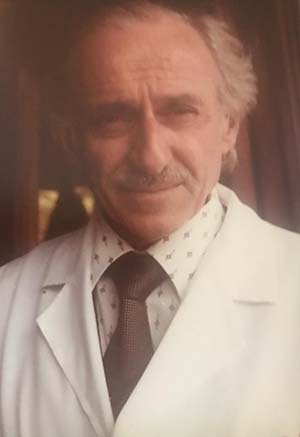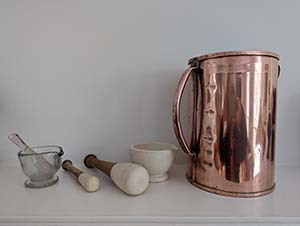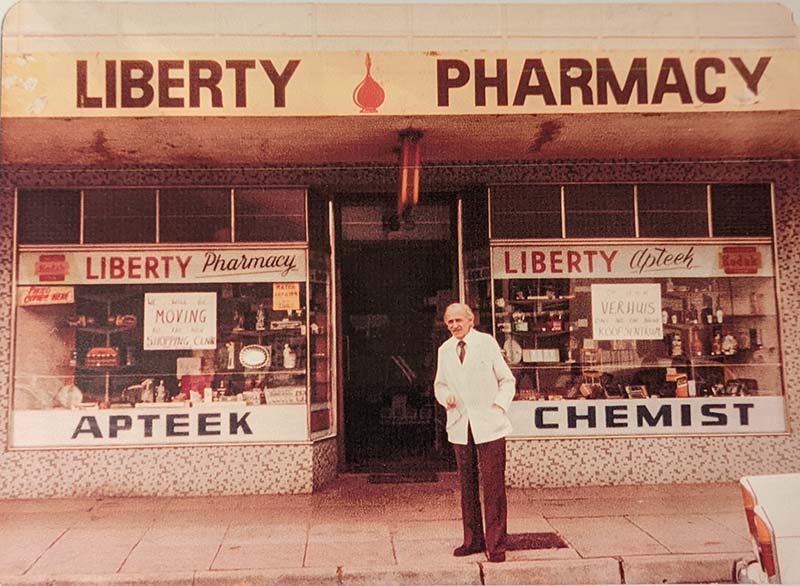As told by Myra Jacobs with input from sons Lionel and Allan Jacobs
1924/5 – 2011

Toddler Chaim Jakobaini, later Charles Jacobs, was assigned the birthdate December 12th, 1924 on his arrival in 1927 in Cape Town by boat, the SS Bendigo. He, his mother and two siblings had made the long voyage from Varniai, Lithuania, to reunite with his father and oldest sibling who had immigrated a couple of years earlier. Records obtained after Lithuania joined the EU in the early 2000s suggest that Charlie was born possibly as much as one year after that assigned birthdate. He passed away after a full life on May 26th, 2011, aged 86 – or was it 85?
We have the advantage of a brief account our father wrote about his early years to draw on for a lot of what follows. Eager as he was to start adult life, our father had no clear idea of what he wanted to do after matriculation from Cape Town High School. He even considered becoming a bioscope projectionist (or so he said – it was always hard to know when he was teasing!) Together with a friend, he chose pharmacy, which was then taught at the Technical College. But once enrolled, Charlie really excelled at his studies, winning awards, including a Silver Medal for final year. It was only the 3rd such bestowed in the preceding 20-year period. He was registered as a “Chemist and Druggist” by the SA Pharmacy Board on December 19th, 1945.
Dad was always interested in issues relating to the profession, both on the business side, and regarding the ethical aspects. One small example of the latter: I recall the anguish he experienced whenever he realized from their purchase history that a loyal customer had developed an addiction to certain OTC medications, and he had reporting obligations to fulfill. He was an avid reader of the “Tincture Press”, the official newsletter of the Pharmaceutical Society of South Africa - indeed, a pile of recent (and not so recent!) issues was always to be found beside his bed. I don’t know whether Charlie ever contributed directly to the periodical, but he was instrumental in its publication of a popular series of a dozen informative, humorous articles on legal topics relevant to retail pharmacists written by his nephew, whose expertise was labour law. The series immortalised our parents as the fictional employers in each hypothetical scenario.
It must have been because us kids needed a lesson on the importance of persistence and determination, but I vividly recall Dad explaining how he had secured his necessary apprenticeship at a time when those positions were scarce. He mounted his beloved bicycle, and set off from his home in Sea Point, riding all along Main Road and stopping to enquire at every pharmacy along the route. He was not successful in his quest until he reached Wynberg! So during his studies, which involved evening classes and some afternoon labs, Dad spent a lot of time traveling to and fro between home, the College, and his apprenticeship. The rate of pay for a first-year apprentice was miserably low, only 6 pounds per month.
Dad explained that until the 1930’s pharmacy was considered a craft – hence the apprenticeship system under a “Master”, and it required lots of tools of the trade needed for the compounding of medications. We still have some of this equipment, now resembling museum artefacts, including old mixing vessels, pestles, the tiny metal weights for measuring out now-arcane amounts (e.g. fractions of drams) of materials on a balance. One of special note is a large copper, tin-lined jug with volume markings on the side, custom-made for Charlie by his life-long friend Jack Frumer, who owned a metalworks factory.
After four years spent working in a pharmacy in Claremont, our soon-to-be married father decided to open his own pharmacy in Goodwood in 1950. He called it Liberty Pharmacy, after the movie house opposite, and its letterhead logo was the Statue of Liberty. He and our mother moved to Goodwood, where a nascent Jewish community of young families was growing fast as professionals and businesspeople started firms and practices there. It seemed to me then, though I am not sure whether this is accurate, that all the physicians, pharmacists, and dentists in the area were Jewish. Even the merchants, the butcher and the fishmonger were Jewish. Almost all the Jewish adults were in the same narrow age range, and there were cohorts of kids of matching ages for all the children. Our congregation of about 25-30 families was established with a rabbi, a synagogue, and weekday after-school Religious School (or “cheder”), where the young students all had a wonderful time running about, playing soccer, and otherwise letting off steam on the generous grounds before and after Hebrew lessons.
This provided for a tight-knit community, much like a shtetl embedded in the surrounding town, a huge extended family of “aunties” and “uncles” for us all. We were bound by our Jewishness, the shul, shared social activities including membership at King David Country Club (continuing decades later at Crusaders/Atlantic in Three Anchor Bay, when, as empty nesters, there was a move from Goodwood to Sea Point), the Lions Club charitable organization, professional ties, and bonds of friendship that have endured through the decades. Indeed, these still connect many of us now even after almost everyone has moved away from the area and the shul has long since been deconsecrated.

This community cohesion was a blessing, as the Jewish congregation in Goodwood and other Northern Suburbs differed demographically from the majority of the residents by several criteria, including political allegiance. At age 18, I recall going along with my parents to cast my vote in an election, and that was my first (but certainly not last) experience in supporting “the opposition” along with them! Our parents were not political activists, but applauded the transition to majority rule in 1994. I remember Charlie bemoaning the fact that the opportunity was not taken to exploit the intense flood of goodwill in the country to exact more of a financial sacrifice from the more privileged classes, specifically by expanding the modest “transitional levy” from only some companies to encompass all of the wealthy. With their very strong moral stance on fairness, honesty and justice, our parents both revelled in the investigative journalism of the “Noseweek” magazine, and saved issues for us to peruse on our visits home.
Our father was ably assisted with his business for about 20 years by our mother, Mona. They both worked very hard, and the fruits of their labour included the excellent graduate educations and careers for us that made them proud, as well as regular overseas travel. Like many wives of pharmacists then, Mom did whatever was necessary. She assisted customers, and also used her talents and training as a bookkeeper. In addition, Mom ordered the range of gifts that the pharmacy carried. She especially relished going on training courses run by the cosmetics houses whose products the pharmacy sold. Others were also employed in the pharmacy – assistants, including a sister of Charlie’s, sometimes an apprentice pharmacist. All of us were expected to lend a hand with simple tasks in the pharmacy in the busy runup to Christmas. I recall gift-wrapping grimly, sometimes over again, to exacting standards of neatness!
In those days, many customers received their purchases by bike delivery, and the “delivery boys”, as they were then labelled, were indispensable. One such delivery person had worked very satisfactorily for some years. It was not till he acknowledged the instructions for delivery of medications to a certain address by saying that the customer lived “in die huis met die rooi dak”, that Dad had the first inkling that his bright, longtime employee was illiterate - a sad reflection of the inequities of the system.
For various periods our father also co-owned a few other pharmacies with his friend and partner, pharmacist Mike Margolis, but management from afar proved too much of a headache. One of these pharmacies was downtown in Plein Street. Our father had really hoped that I would follow in his footsteps, and he wanted to keep that location for me. However, pharmacy held little appeal for me – I did not enjoy the retail aspects at all and had seen at firsthand the enormous effort involved in running a business. But having been allowed to occasionally help with stirring an ointment or liniment had evidently worked some magic on me, for I later became a bench scientist.
Looking back, I am in awe of how energetic my parents were – not only working 5 1/2 days per week, being active members of the Jewish congregation, but spending their free time on the weekends in charitable endeavours, weekly trips schlepping all their kids to visit grandparents and cousins, as well as many picnic excursions with other families. It must have been a huge boon to parents in those days to be freed from any housekeeping duties by the sterling efforts of their domestic staff – our household had two fulltime domestics. Our talented cook, Agnes Johannes, was a family stalwart with whom we maintained a close relationship after she retired – it was a grievous loss when she passed away just a few years ago.
Our father sold his business while still in his 50s, a few years after Mom stopped work. Retirement did not suit him – he was miserable not having a busy schedule - even though he could spend countless hours on the bowling green, where he remained a champion player through to old age.

Chas Jacobs outside pharmacy 1982
Around 1982 Dad embarked on a second pharmacy career in the Cape Provincial Administration, one that gave him a lot more collegial day-to-day interaction than he had as a solo pharmacist, or supervising an apprentice, all in a package of relatively short, fixed hours, and the unaccustomed bonus of many benefits. And the nature of the work was a big change from retail pharmacy: Charlie was employed at Karl Bremer Hospital, Bellville, part of a team of mostly older, Jewish pharmacists like himself. Their unit prepared bulk medications for distribution to patients at the many day hospitals and clinics in the Western Cape. He threw himself into what were for him new fields, such as the logistics of clean rooms, bulk packs, transportation, and coping with employee union demands. Occasionally he also dispensed from some of the day hospitals. He remained at Karl Bremer well past the usual retirement point – apparently because of some administrative oversight. He kept quiet because he enjoyed his work. Finally, HR noticed, and he was obliged to retire properly on the grounds of ”advanced age”, as the severance letter put it!
Charlie and Mona celebrated the major milestones of their marriage, and their big birthdays, with large, memorable parties at restaurant or sports hall venues. They travelled extensively, while their health held, and for about 20 years enjoyed annual trips to spend quality time with Myra and Allan and their families in North America. So despite the challenges of geography, they were able to develop close relationships with their grandchildren, and pass on their values of integrity and service to that generation as well.
